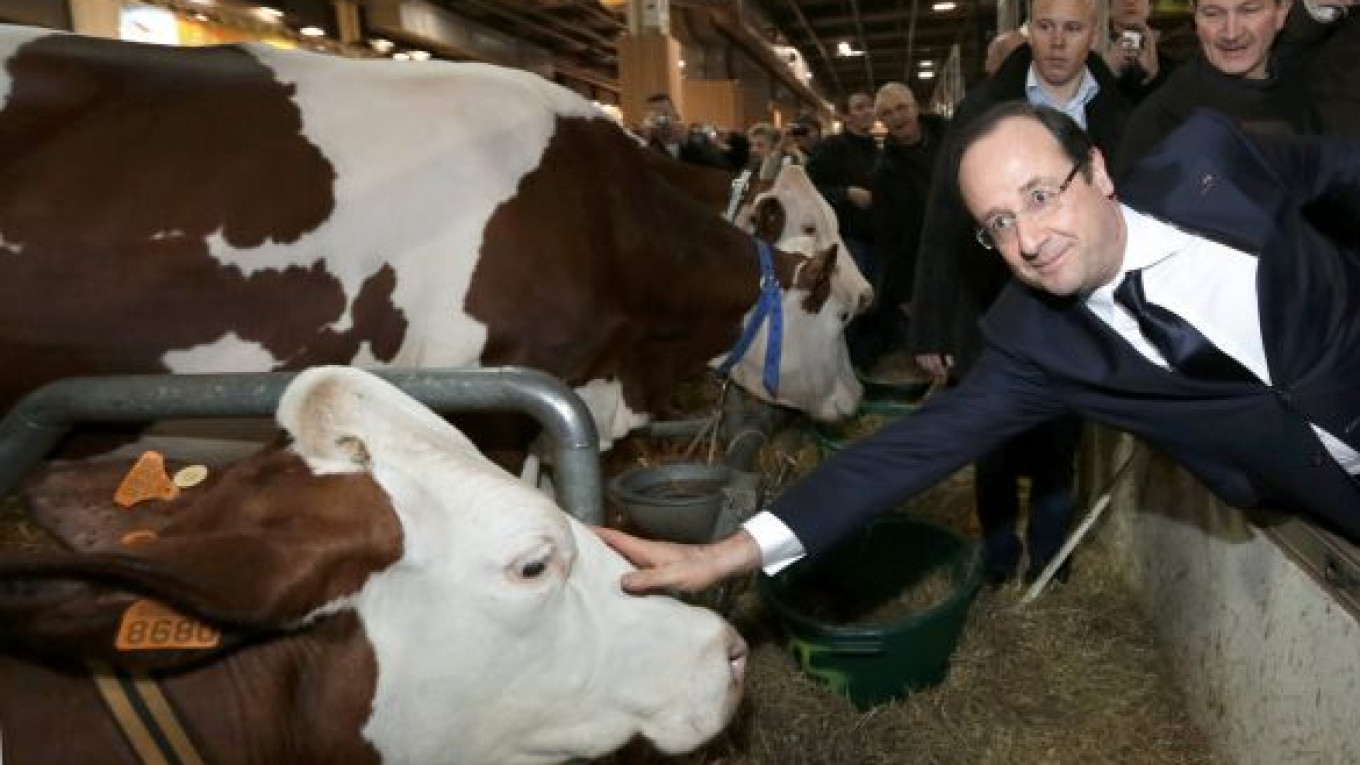Just days after French film star turned Russian citizen Gerard Depardieu provoked mockery and disgust by dining and dancing with Chechen strongman Ramzan Kadyrov, French President Francois Hollande is to hold one day of talks with President Vladimir Putin this Thursday.
Hollande is the second influential European leader to visit Moscow after German Chancellor Angela Merkel in December, and observers expect him to follow Germany’s lead in having a more critical and open discussion with his Kremlin host.
The Frenchman arrives late this Wednesday with a delegation including four Cabinet ministers and more than a dozen business leaders, according to a French diplomat who asked not to be quoted by name in line with embassy policy.
Hollande, who defeated Nicholas Sarkozy in the French presidential election last May, has made it clear that he will not continue his predecessor’s cozy relationship with Putin, and both leaders’ first meeting in Paris in June was reported to have been frosty.
During his stay, Hollande is planning to meet civil society and opposition representatives, the Paris-based Le Journal du Dimanche reported.
Merkel also met with opposition leaders and human rights activists during her visit, a practice that has been common for visiting U.S. dignitaries but that European leaders tended to avoid in the past in order to not offend the Kremlin.
The European Union and Russia are major trading partners, and business interests have been dominant in shaping policies toward Moscow for major EU powers like Germany and France. But the ongoing massive crackdown on the opposition that started with Putin’s return to the presidency last spring has prompted a reassessment.
The European Parliament has repeatedly condemned Moscow in the past months, and the German Bundestag last fall made a highly unusual move in passing a damning motion against Russia.
Putin, on the other hand, is thought to have dealt a PR blow to Hollande when he surprised the world in January by handing Depardieu a Russian passport after the actor had complained about a planned 75 percent luxury tax championed by the French president.
Depardieu subsequently belittled the country’s opposition as disoriented and attacked foreign critics of the prosecution of the punk band Pussy Riot.
Last weekend, he flew to Saransk to register under the highly symbolic address 1 Democracy Street in the capital of the Mordovia republic before flying to Chechnya, where he was celebrated by Kadyrov for two days.
The leader of the once-war-torn North Caucasus region has been accused by human rights activists of ruthlessly persecuting his opponents, including a string of killings in Moscow and as far away as Vienna and Dubai.
Rights activists called upon Hollande on Tuesday to address human rights and democracy during his talks with Putin.
“The last year has been the worst for human rights in Russia in recent memory, and Hollande should not miss this chance to persuade Putin to turn things around,” Human Rights Watch said in a statement.
The organization also said the French president should press Moscow to address the huge toll of the Syrian crisis on civilians, including by supporting a United Nations Security Council arms embargo.
In a letter published by Liberation, four prominent French rights activists warned that Hollande should not forget his 2011 call when he urged Moscow to uphold the Russian public’s “desire for democracy.”
Analysts said that while Hollande and other European leaders would focus more on those issues in the future, they wouldn’t forget their countries’ pragmatic business interests either.
“All European leaders are very concerned and will try to get this message out during any meetings [with Putin],” said Frazer Cameron, head of the EU-Russia-Center, a Brussels-based think tank.
Sergei Utkin of the Moscow-based Institute of World Economy and International Relations, said the urge to raise these issues was understandable and such public criticism should not be overrated.
“Can you imagine that Russian policy would change under pressure from an outside leader and that Putin would say, ‘Yes, you’re right, I will change course’?” he said. Instead, he added, Western leaders would continue to expresses “ritual concerns” about human rights, while Putin and government officials would offer “ritual replies” that everything is legally sound, Utkin said.
However, analysts agreed that while Moscow regularly expresses frustration about foreign criticism over its domestic policies, this does not necessarily hurt trade and business ties.
As evidence, they pointed to recent figures by Germany’s Committee on Eastern European Economic Relations, also known as Ostauschuss, according to which German exports to Russia surged 10.4 percent last year, reaching a record 38 billion euros ($50 billion).
Utkin said open criticism wouldn’t hurt ties, as long as it doesn’t get personal. As examples, he pointed to Estonia and Czech Republic, whose leaders have been most critical toward Moscow, while Russians travel there en masse and buy their products.
“It would be wrong to fear some Russian wrath over foreign criticism,” he argued. “After all, the country also has to gain economically.”
Contact the author at n.twickel@imedia.ru
Related articles:
A Message from The Moscow Times:
Dear readers,
We are facing unprecedented challenges. Russia's Prosecutor General's Office has designated The Moscow Times as an "undesirable" organization, criminalizing our work and putting our staff at risk of prosecution. This follows our earlier unjust labeling as a "foreign agent."
These actions are direct attempts to silence independent journalism in Russia. The authorities claim our work "discredits the decisions of the Russian leadership." We see things differently: we strive to provide accurate, unbiased reporting on Russia.
We, the journalists of The Moscow Times, refuse to be silenced. But to continue our work, we need your help.
Your support, no matter how small, makes a world of difference. If you can, please support us monthly starting from just $2. It's quick to set up, and every contribution makes a significant impact.
By supporting The Moscow Times, you're defending open, independent journalism in the face of repression. Thank you for standing with us.
Remind me later.


